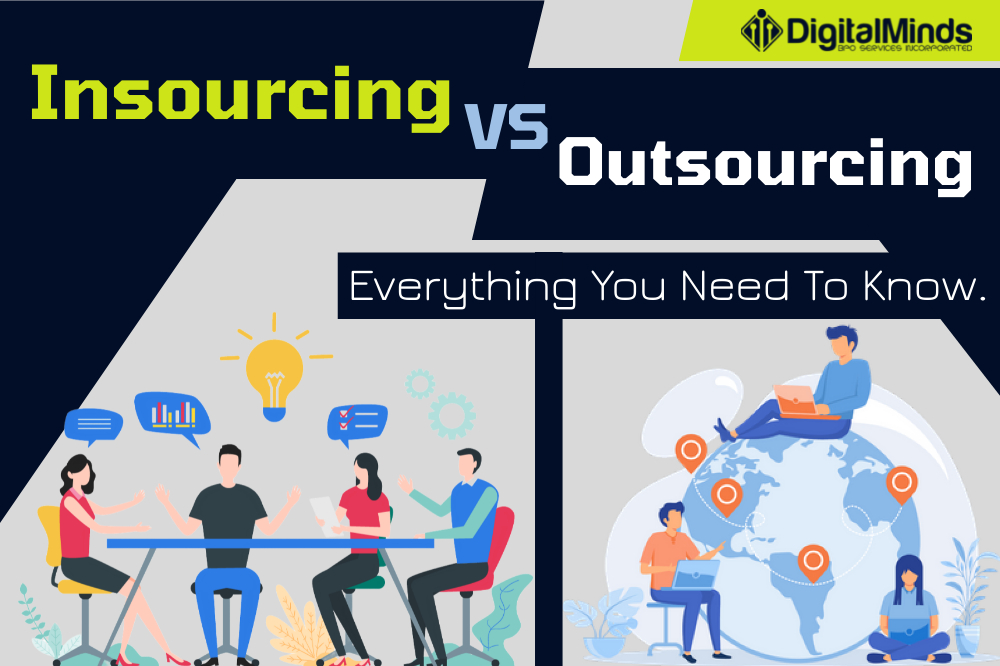What is outsourcing? This is a question that many business owners and entrepreneurs have asked themselves at some point or another. It’s become an increasingly popular way for businesses to reduce costs and improve efficiency. However, before you decide to outsource any work, it’s important to understand the pros and cons of outsourcing and what this could mean for your business. In this blog post, we’ll provide an overview of what outsourcing is, the benefits and drawbacks of outsourcing, and some real-world examples of how businesses have outsourced successfully.
What Is Outsourcing?
Outsourcing is the process of contracting with another company or individual to provide services or products that your business needs. This can include anything from manufacturing and production to customer service and administrative tasks. In many cases, businesses choose to outsource work to countries where labor costs are lower than they are in the United States. This allows businesses to save money while still getting the work done that they need to be done.
Types of Outsourcing Based on Location
There are a few different types of outsourcing arrangements that businesses can enter into.
Offshoring
The most common type of outsourcing is known as “offshoring.” This is when a business contract with another company in another country to have work done. The most common example of this is when businesses outsource work to countries like India, China, and the Philippines.
For example, a company might outsource its customer service to a call center in the Philippines. Or, a clothing company might manufacture its products in China.
The main advantage of offshoring is that it can save businesses a lot of money. This is because labor costs are often much lower in other countries than they are in the United States.
Nearshoring
Another type of outsourcing arrangement is known as “nearshoring.” This is similar to offshoring, but instead of contracting with a company in another country, businesses contract with a company in a neighboring or nearby country. This is often done to reduce shipping costs and time. For example, a company in the United States might contract with a company in Mexico to have work done.
Onshoring
The last type of outsourcing arrangement is known as “onshoring.” This is when a business contracts with another company or individual within the same country. This is often done when a company wants to contract with another company that specializes in a certain type of work. For example, a company might contract with an IT company to manage its computer systems.
What are the Common Types of Outsourcing Services?
There are a few different types of work that businesses commonly outsource. These include:
1. Web Development
2. IT Support
4. Creative Services
5. Marketing and Advertising
9. Data Entry
10. Human Resource Management
READ MORE: 62 Outsourcing Services You Need To Know To Grow Your Business (Ultimate List)
What are some examples of outsourcing?
Outsourcing can take many different forms. Some common examples of outsourcing include:
Manufacturing: When a company outsources manufacturing, they’re contracting with another company to produce products for them.
Call Centers: When a company outsources its call center, they’re contracting with another company to handle customer service calls.
IT Support: When a company outsources IT support, they’re contracting with another company to provide technical support for their employees.
Human Resources: When a company outsources human resources, they’re contracting with another company to handle employee recruitment, training, and benefits.
What are the Advantages of Outsourcing?
Now that we’ve answered the question “what is outsourcing?” it’s time to take a look at some of the reasons why businesses choose to outsource.
Outsourcing Can Save Money
One of the most common reasons that businesses choose to outsource is because it can save them money. When you outsource work to another company, you don’t have to pay for the overhead costs that come with hiring employees. This includes things like benefits, insurance, and vacation time. Additionally, you can often get the work done for less money when you outsource to another country.
Outsourcing Can Save Time
Another reason that businesses choose to outsource is that it can save them time. When you have another company handle a task for you, it frees up your time to focus on other aspects of your business. This can be especially helpful if you don’t have the staff or resources to handle the task yourself.
Outsourcing Can Improve Quality
In some cases, businesses choose to outsource work to improve the quality of the work that they’re getting done. When you contract with another company, you can often get access to skilled workers that you wouldn’t be able to find on your own. Additionally, the company that you’re contracting with is likely to have better resources and equipment than what you have available.
Increased Staffing Flexibility
Outsourcing can also provide you with increased staffing flexibility. When you contract with another company, you can often get the work done temporarily. This can be helpful if you only need the work done for a short period. Additionally, it can allow you to scale up or down your staff as needed without having to go through the process of hiring and firing employees.
Access to skills or resources
Outsourcing can also give you access to skills or resources that you don’t have in-house. This is especially helpful if you’re a small business that doesn’t have the staff or resources to handle a certain task. When you contract with another company, you can get access to the skills and resources that you need to get the job done.
Ensure Business Continuity
Finally, outsourcing can help you ensure business continuity. When you contract with another company, you can be sure that the work will get done even if something happens to your business. This is especially helpful if you’re a small business that doesn’t have the resources to handle everything on your own.
What are the Disadvantages of Outsourcing?
Lack of Control
One of the biggest disadvantages of outsourcing is that it can lead to a loss of control. When you contract with another company, you’re giving up some control over how the work is done. This can be especially problematic if you’re not happy with the results that you’re getting.
Confidentiality and Security
Another disadvantage of outsourcing is that it can pose a threat to confidentiality and security. When you contract with another company, you’re giving them access to your data. This can be a problem if the company is not reputable or if they don’t have adequate security measures in place.
Language and Cultural Barriers
Another disadvantage of outsourcing is that it can lead to language and cultural barriers. When you contract with another company, they may be located in another country. This can make communication difficult and can lead to misunderstandings. Additionally, the company may have different values and customs than what you’re used to.
How to Outsource Effectively?
Now that you know the pros and cons of outsourcing, you may be wondering how to outsource effectively. Here are a few tips:
- Define what tasks you want to outsource.
- Research potential vendors.
- Create a Request for Proposal (RFP).
- Compare proposals and choose a vendor.
- Negotiate the contract.
- Set up communication and expectations.
- Monitor the work being done.
Outsourcing can be a great way to save time, improve quality, and increase staffing flexibility. However, it’s important to outsource effectively to get the best results. Following the tips above can help you outsource effectively and get the most out of your outsourcing experience.
What is an outsourcing company?
An outsourcing company is a business that contracts with another company to provide services or products. Outsourcing companies typically specialize in a particular type of work or product. For example, there are outsourcing companies that specialize in web design, customer service, or data entry.
How do I find the right outsourcing provider?
There are a few things that you should consider when finding the right outsourcing provider:
- The type of work that you need to be done.
- The size of the company.
- The location of the company.
- The price of the services.
- The reputation of the company.
Finding the right outsourcing provider can be a challenge. However, it’s important to take the time to find a company that you can trust. Following the tips above can help you find the right outsourcing provider for your needs.
There are a few things to keep in mind when outsourcing:
- Make sure that you define the scope of the work that you want to be done.
- Make sure you understand what is being outsourced.
- Find a reputable company that specializes in the type of work
- There should be clear communication between you and the company.
- Set realistic expectations.
- Be prepared to pay a fair price for the work being done.
Outsourcing can be a great way to save time and money, but only if it’s done effectively. Keep the tips above in mind when outsourcing to get the most out of the experience.
Outsourcing Mistakes to Avoid
When outsourcing, there are a few mistakes that you should avoid:
- Not Defining the Scope of Work: One of the biggest mistakes that companies make when outsourcing is not defining the scope of work. This can lead to problems with communication and expectations.
- Hiring an Inexperienced Company: Another mistake that companies make is hiring an inexperienced company. It’s important to find a company that has experience with the type of work that you need to be done.
- Not Having Clear Communication: One of the most important things when outsourcing is to have clear communication. Without clear communication, it can be difficult to get the results that you’re looking for.
- Setting Unrealistic Expectations: One of the biggest mistakes that companies make when outsourcing is setting unrealistic expectations. When you set unrealistic expectations, you may be disappointed with the results.
By avoiding these mistakes, you can have a successful outsourcing experience.
Conclusion
Outsourcing is a popular business practice that can offer many advantages. However, it’s important to understand the pros and cons of outsourcing before making a decision. In addition, it’s important to know how to outsource effectively to get the most out of your outsourcing experience. Following the tips in this article can help you make the most of your outsourcing experience.
If you’re thinking about outsourcing some or all of your business processes, be sure to contact us at Digital Minds BPO. We have years of experience helping businesses just like yours realize the benefits of effective outsourcing. Let us show you how we can help streamline your operations and improve your bottom line!
Do you have any questions about outsourcing? Let us know in the comments below!
CONTACT US NOW!
Contact us today to learn more about our outsourcing services.










